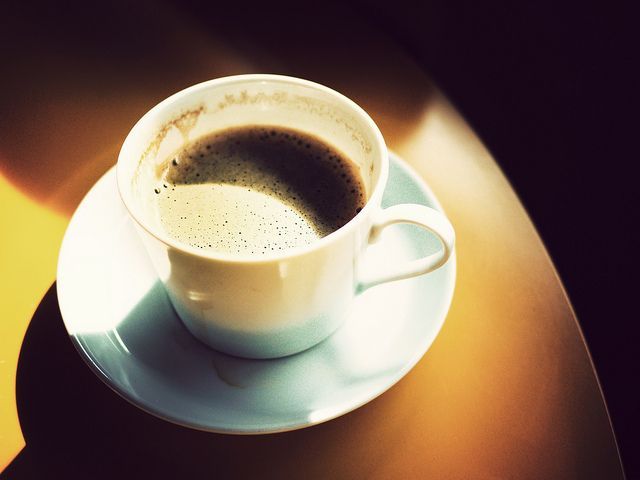Photo Credit Daniel Go/Flickr
By Colleen Mertes
Copy Editor
Coffee’s popularity in America shot up in 1773, when the Boston Tea Party made drinking tea unpatriotic. Coffee could be imported from South and Central America without the help of the British, beginning a love affair with the drink. It became a symbol of American freedom and independence of Britain. Civil and world wars elevated consumption- and we have not been able to stop drinking it, which could be a good thing in terms of cancer risk reduction.
Cancer is the 2nd leading cause of death in our country. Whether you drink coffee as an act of patriotism, for the bitter taste or for antioxidants, you could possibly be reducing your risk for developing certain cancers in the future.
The side effects of too much coffee are well known. Insomnia, restlessness, nausea and increased heart rate are among the top. The addiction to caffeine is also a cause for much apprehension towards daily coffee intake. Headaches, anxiety, and agitation are symptoms of caffeine withdrawal. But are coffee’s benefits better than the negative effects?
Cody Poneroy, a Stony Brook psychology student, says there are some risks, but that “it depends on the person. It’s individual risks.” He drinks 2 to 3 cups in normal day, but not for any benefits, simply because he likes the taste. It’s normally his breakfast.
According to the American Institute for Cancer Research, coffee is a good source of B vitamin riboflavin and antioxidant phytochemicals, including chlorogenic acid, an antioxidant, quinic acid, the phytochemical responsible for the acidic taste, cafestol and kahweol, caffeine, a stimulant to the central nervous system, and N-mthylpyridinium, an antioxidant booster. They say there has been over 1,000 studies on coffee’s link to cancer. Although, early studies hinted it may increase the risk of cancer, majority of studies now propose the opposite.
The Institute singled out cancers it felt the had enough studies to safely make a conclusion. They say that diets high in coffee with probably lower your risk of endometrial and liver cancers, but will be unlikely to lower the risk of pancreatic and kidney cancers. Other cancers may have links to coffee, but the research is still premature.
What is it about coffee that reduces the risk of cancer?
The American Institute cited the phytochemicals in coffee help control cell growth while reducing cancer cell development. Chlorogenic acid acts in the same way, going steps further to reduce inflammation and increase self destruction of cancer cells. Kahweol and cafestol stimulate enzymes that render carcinogens harmless.
Coffee is a diuretic, meaning it can speed through the digestive tract, taking along with it carcinogens. The reduced exposure could correlate to a reduced risk of colorectal cancer. It also reduces insulin resistance and, in turn, could reduce cancers stimulated by excess insulin.
Jennifer Fitzgibbon, registered Oncology Dietician at Stony Brook University Cancer Center, said that research on coffee is showing promising association to lower risks of liver, mouth, throat,, colorectal, prostate, endometrial and skin cancer. Recent studies have found that people who drink 3 or sometimes 4 cups of coffee a day had significantly lowered risk of developing these types of cancer. Fitzgibbon stresses that “more studies are needed to establish the causality of this association and to find the true reason behind these benefits.” She applauds this type of research saying it “holds a lot of optimism and opportunity for more research.”
Research has suggested these lowered risks, but it is not scientific truth. However, moderate coffee intake (1-2 cups a day) “doesn’t seem to be harmful,” according tto Fitzgibbon, but she also notes the serious risks of drinking too much caffeinated beverages. Caffeine withdrawal can be very serious, most common symptom being a headache, but others include anxiety, fatigue, drowsiness, and depression.
Brogan Harte, a junior journalism student at Stony Brook University, drinks 3 to 4 cups of coffee a day. She said she does not see many risks with her coffee intake. “I’ll keep doing it,” she said, but added that “when you drink that much coffee, it’s not going to keep you up,” referring to the use of coffee to fuel studying all night.
Like Harte and Poneroy, Fitzgibbon’s stance on coffee intake has not changed much. While she provides recommendations on a case by case basis to patients, she said green tea has been the choice drink to promote. She adds that if the patient does drink coffee, they do not add copious amounts of milk, sugar, sweeteners, and other additives as it will negate the benefits.
In light of the associations found, Fitzgibbon said that if a patient “likes coffee and is taking Tamoxifen (a cancer fighting drug, suggested to work well with coffee), then there is no reason to stop.” Just two cups a day can make a difference.


